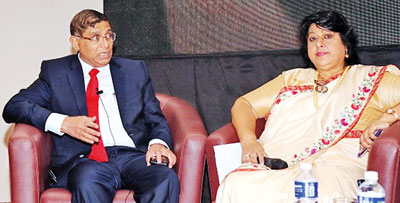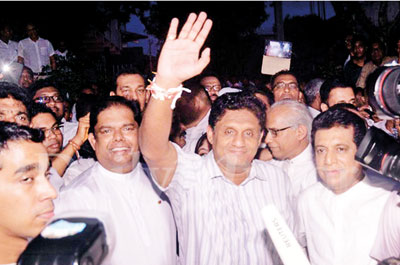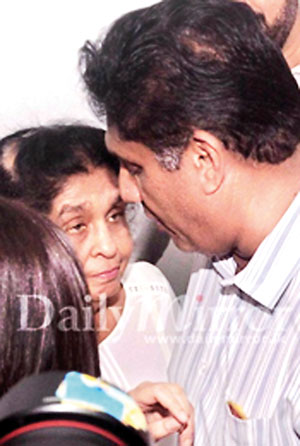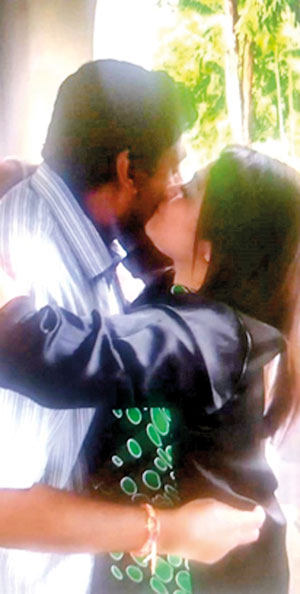Columns
‘Make or break the law’ Dilrukshi’s indiscretion
View(s):
SCANDAL: Dilrukshi Dias Wickremesinghe was a Guest Speaker at a seminar on the importance of ethics in the public sector not even three weeks ago this month on the 10th. Pictured above with President of the Institute of Chartered Accountants Jagath Perera at the event
If the ex-Bribery Commissioner, presently Lanka’s Solicitor General, Dilrukshi Dias Wickremesinghe, who was interdicted overnight by the Public Services Commission this Monday over a secretly recorded conversation with Avante Garde Chairman Senadhipathi which exposed her shocking lack of professional conduct and ethics, is still bent on maintaining her top post as the nation’s No2 Law Marshal in the belief that, if she resigns now, she will be unable to clear her name; then she must be told that not all the waters of the Mahaweli can cleanse the stain she herself had mired herself with by having a clandestine phone conversation with the first accused Senadhipathi in the Avante Garde case she herself had brought charges against three years ago for making a loss of Rs. 11.4 billion due to the Government.
The scandal erupted when a secretly recorded conversation between Dilrukshi Dias Wickremesinghe and Avante Garde Boss Nissanka Senadhipathi mysteriously surfaced on social media last Friday. Though Ms. Dilrukshi has confirmed that it’s her voice and that the conversation did indeed take place, neither did she nor anyone else nor any clue in the tape give any hint of exactly when the conversation had transpired, though it can safely be presumed that it is after she had filed charges against Nissanka Senadhipathi, Gotabaya Rajapaksa and others and before the release date of the tape.
But the timing of the release of the tape to the social media couldn’t have been better, coming as it did on the eve of a presidential election.
According to Ms. Dilrukshi, a minister had called her and said Nissanka wished to speak to her and had passed on the phone to her. And the conversation had begun.
First a few choice excerpts of the conversation spoken in a mixture of Sinhalese and English:
- I never expected your business to collapse in this manner because it was one of the best businesses in the country.
- Mama dannawa, Nissanka, if I ever had the slightest knowledge – mata nikamata hari hithuwanam may wage deyak siddha waye kiyala – If I just for nothing even thought that this kind of thing will happen.
- Mokada mama jeevithayata wath hithunanam oya ge business eka nathi waywe kiyala, mama jeevithayata oya naduwa danne nay – if, for the life of me, I thought that you will lose your business as a result, I would never, for the life of me would have put this case.
- You know that I am one who has read over 7500 letters that were there in your office. I have personally read each one of them. I know how when your officers were in your ship how you looked after their families. Other people only think but I am not like that.
- Mama atthatama Nissankanka harima duk vuna, mama puduma vidhiyata duk vuna – Truly, Nissanka, I was unbelievably saddened.
- Mama Gotabaya Rajapaksata wath viruddha nadu danne nay – I wouldn’t even have filed action against Gotabaya Rajapaksa.
- Mama atthatama karapu mewa eka ganama REGRET venawa – I truly regret the entire episode.
- I know how to make the law and break the law both.
 But before we proceed first a few question must be posed to ex-Bribery Commissioner Dilrukshi: Whether, when she said on the phone to Nissanka Senadhipathi in a sort of pally- pally informal way on first name terms “You know, Nissanka, that had I known, even for a moment, that my filing action against you would lead to the collapse of your company and result in hundreds of your employees jobless and their families forced to suffer hardship, and that enormously grieves me and I regret ever having taken it,” it’s the new jurisprudence she preaches to all public prosecutors to adopt immediately?
But before we proceed first a few question must be posed to ex-Bribery Commissioner Dilrukshi: Whether, when she said on the phone to Nissanka Senadhipathi in a sort of pally- pally informal way on first name terms “You know, Nissanka, that had I known, even for a moment, that my filing action against you would lead to the collapse of your company and result in hundreds of your employees jobless and their families forced to suffer hardship, and that enormously grieves me and I regret ever having taken it,” it’s the new jurisprudence she preaches to all public prosecutors to adopt immediately?
Whether, before filing criminal charges against the boss of a major company on account of a billion buck fraud, a public prosecutor must first weigh the hardships that would be heaped on the company’s employees and if so, that the charges should be dropped and no action be taken in respect of the criminal activity of the company’s owner?
On 19 February 2015, merely a week after her appointment as the Bribery Chief, Ms. Dilrukshi held a media conference where she firmly stated: “If there is evidence against anyone, I will ensure he will be brought before courts.” What made her change her mind after bringing Senadhipathi before the courts?
If she couldn’t take the heat and stop the falling tears, she should have resigned forthwith and admitted to herself that she was not man enough to do the job she once so enthusiastically embraced. And, incidentally, is this the same jurisprudence — that demands that a socio economic survey must first be made before a decision is taken to file charges — she follows today as the Nation’s Solicitor General? Is this to be made a ground that must be first satisfied before a single criminal charge is filed?
Tears and heartbreak over what will happen to suspects families if they are found guilty and jailed are luxuries no public prosecutor can afford to have if the criminal law of the land is to prevail.
Now a brief background on the case which left the former Bribery Chief Dilrukshi awfully grieved. On 31 August 2016, she moved the Colombo Chief Magistrate’s Court against former Defence Secretary Gotabaya Rajapaksa, Chairman of Avante Garde Nissanka Senadhipathi and six others for illegal authorisation of Avant Garde Maritime Services run floating armouries. The Bribery Commission charged the suspects on 19 counts for permitting Avant Garde Maritime Services to operate a floating armoury resulting in losses worth Rs 11.4 billion to the government.
This Monday, 3 days after the phone tape had been released, the Colombo Chief Magistrate acquitted the former Defence Secretary Gotabaya Rajapaksa, Chairman of Avante Garde Nissanka Senadhipathi and six others over the Avant Garde floating armoury case. Mr. Rajapaksa had filed a revision petition in the Appeal Court against the case following which an order had been issued to the Chief Magistrate to acquit all the eight accused. This he did.
It may have been a case of all’s well that ends well for them but, alas, not for Dilrukshi who finds her reputation in tatters and her career in shatters as a result of her own gross indiscretions. But she is determined to fight to the end, it seems, to salvage whatever flotsam is left from the wreckage.
Upon the obviously politically motivated release of the damning phone tape, Dilrukshi used her personal Facebook profile last Saturday to break her silence and to pose two counter questions for Avante Garde’s Senadhipathi to answer. And here’s what she said:
Mr. Senadhipathi,
As a public officer, I am not permitted to make public or press statements. Therefore please respond to the following.
1. Please publish the entire telephone conversation without editing, doctoring and distorting the contents.
2. Please disclose to the public the name of the minister to whose telephone you called and the reason why the said minister passed the telephone to me.
Let’s first consider her introductory sentence, ‘As a public officer, I am not permitted to make public or press statements.’ Is that really so? In March 2015, after the present government had appointed her as the new Bribery Chief, Mahinda Rajapaksa claimed in public that in 2002, Dilrukshi Dias Wickremesinghe had drawn two salaries from the government, one whilst working at the Attorney General’s Department and the other as a Consultant to the Telecommunications Regulatory Commission.
Did she respond to the allegation made by the former president? Yes, according to the Daily Mirror published on 2 April 2015. The newspaper reports that Ms. Dilrukshi made a statement to the paper at 9. 30 pm that night categorically denying the allegation. She said that she was innocent and was ready to prove her innocence at any forum. The Director General of the Bribery Commission, Ms. Dilrukshi Wickremesinghe stated that the baseless and frivolous allegations were made to demoralise her and prevent her from fighting corruption.
It was right of her to respond to the allegation levelled at her personally. The rule that a public officer is not permitted to make public or press statements only holds true when it comes to making statements on public issues which are in the realm of their political masters and cannot apply when one’s personal reputation and good name and character are attacked. If it’s not, so then all public servants would be sitting ducks for any public heckler to heap calumnies upon them without fear of the consequences, knowing full well that they are denied right of reply by the Administrative Code.
If Ms. Dilrukshi had thought otherwise and made an error of judgement in interpreting the rule, she may not have realised that she herself set a precedent in April 2015 when she stated to the media that she was innocent of the allegation and, if that was not enough, went on further to impute motives as to why Mahinda Rajapaksa had publicly made the claim against her which, in her opinion, was ‘to demoralise her and prevent her from fighting corruption.’
On the first question she posed to Mr. Senadhipathi to release the ‘entire telephone conversation without editing, doctoring and distorting the contents, yes he should. The possibility of distortion and parts of her conversation being taken out of context do exist. But the stand alone comments she made during the course of the conversation are damaging by themselves wherever they are placed. For instance ‘how saddened she is by what happened and that had she known her action would have led to the collapse of his company, she, for the life of her, would have never filed action against Senadhipathi,’ stand alone in any context.
Another is her now famous phrase, ‘I know how to make the law and I know how to break the law.’ No matter where it was said, whether it was edited, whether it was taken out of context does not have the slightest bearing on its import. It stands on its own to reveal the extreme degree of arrogance she is possessed with. If it was thought till now by the people that only politicians were cursed with such arrogance, now they know that certain high up public servants are not immune to the malady as well.
On the second question she asked Mr. Senadhipathi to provide answer as to who the minister was did she naively think that he would betray the minister who had helped him succeed in achieving his political agenda or go to buckle what has been so easily gained. But Ms. Dilrukshi knows the minister, so the question can be raised why doesn’t she reveal the name? Well, it’s not that simple. Having no evidence to prove her claim as to the identity of the minister or even whether a minister actually existed, perhaps, and understandably, the laws of defamation prevent her from revealing his identity in public without having a leg to stand in court if sued for millions by the named minister for libel.
No time or date is indicated when this conversation happened. But the conversation makes it clear that it occurred after charges had been filed in court by Ms. Dilrukshi against Senadhipathi. It could have happened after she returned to her old job as additional Solicitor General or when she was appointed as Deputy Solicitor General or when she was promoted as the Solicitor General. Perhaps, Ms. Dilrukshi could enlighten the nation on that score.
The Attorney General forwarded a directive to the Public Service Commission to conduct an inquiry. But so grave a view did the PSC take that it interdicted her overnight pending the inquiry.
For the present purpose whether her conversation was distorted or not, edited or not, taken out of context or not or who the minister is who passed the phone to her saying Senadhipathi wished to speak to her hardly matters. These are but sins resulting from the original sin she committed when she spoke to the man she had filed action against and which the department she worked as either Additional, Deputy or Solicitor General, namely the Attorney General’s, still has a running legal battle on their hands.
The original sin she had committed was to have flouted a basic ethical rule of the legal profession that a lawyer cannot speak to the client of the opposing side privately without the opposing side’s lawyer being present. In her case, she had spoken privately to a person she, as the Bribery Commissioner had filed charges against and brought before court or, thereafter, as a lawyer representing the Attorney General’s Department which was continuing the case against that person.
She, as she herself has admitted, had done so and, worse, she had broken her heart out to him and expressed her ‘unbelievable grief’ in having filed charges against him in court. All the other sins emanated from this one original sin she had committed. And the question must be asked, why did she speak to Senadhipathi privately when she knew or should have known that to do so was unethical and why did she not say so to the minister and hang up the phone.
Not even three weeks ago, she was a guest speaker at a seminar on “Ethical Responsibility of Professional Accountants in Public Sector” held at the Chartered Institute of Accountants Sri Lanka auditorium conducted by the Association of Public Finance Accountants of Sri Lanka. Here she, as a legal specialist, was called upon to give a lesson on ethics and the importance of maintaining accounts without falling under pressure to act unethically.
In her speech she referred, amongst others, to conflict of interest in certain circumstances. She said: “There are three instances of conflict of interest where in the case of actual conflict of interest is when it occurs at the point of making a decision; secondly a potential conflict of interest is even though a conflict is not evident presently, there is a possibility of such a conflict arising in future; and in the case of perceived conflict of interest there is no actual or potential conflict but in the eyes of others a perception may be created that there exists a conflict of interest.”
What a pity, nay what a tragedy, that such a rising star in the legal firmament, one who knew so much of ethics to lecture others on it and to speak of its importance, should have failed to realise the importance of observing the ethics of her own legal profession, especially one holding the No 2 slot as Solicitor General in the Attorney General’s Department..
Fortune does favour the daring as Sajith grabs UNP crown from RanilIf he wins the presidency, he’ll be the first elected UNP president since his father President Premadasa  SAJITH FOR PRESIDENT: ‘The younger rises when the old doth fall’ As Shakespeare would have put it, there was a tide in the affairs of Sajith which he took at the flood and which led him on to challenge the leadership whose shelf life had long since expired and to emerge triumphant at the end. Had he waited for the fossilised Working Committee to hand him the nomination on a platter to him to lead the UNP to a presidential triumph in November this year, both he and his party’s fortunes, most probably, would have been bound to lie in the shallows for the next five long years. But Sajith discerned the current and was brave enough to take it, even though for a while it embroiled the UNP in a bitter internecine war from which, it seemed, they would lose their venture, with the entire ship going down, to the cacophony of bellicose clamour as those aboard, oblivious as to their fate, continued to hurl barbs at one another. Luckily, fortune favours those who dare; and Sajith won the day. At the eleventh hour, both sides did realise that if they ventured forth on this suicidal course, they will all wittingly perish, leave none to mourn. The truce bell was sounded and all rallied around its call. Compromises were made, conditions were met and the Old Guard surrendered the torch to the New. The unity of the party was saved in the nick of time; and the party survived to fight another day.  MOTHER’S BLESSINGS: Sajith embraced by his mother Hema, a former First Lady The terms of the deal were that Sajith Premadasa would be the party’s presidential candidate whilst Ranil Wickremesinghe would retain his mantle as leader of the UNP and continue to wear the prime ministerial cape. The unity of the party, too, was preserved. New blood, though known, had been infused and the party had a new face, though well familiar, to face the presidential hustings. And, above all, the party’s spirit had been uplifted, its morale raised to a new pitch. Suddenly the UNP seemed on a high and raring for battle. And the public’s interest, too, had been revived and raised. The party’s internal war had become a spectator sport and, for the last few weeks, the question on people’s lips was not ‘who will win the election’ but who the UNP will nominate as its presidential candidate.  VICTORY HOMECOMING: Sajith receives a loving kiss and a warm hug from First Lady hopeful, wife Janali And for all that, credit must go to 52-year-old Sajith. He had shaken the plum tree and brought down the over ripened fruit that stubbornly held on to its stem and refused to fall. By storming the citadel and demanding the knights to consider his candidature and threatening he will take his battle elsewhere if they did not, he broke the staid laid back image the UNP had possessed for so long and turned it into a fighting force with the motto tattooed on their forehead: ‘Ask and thou shall be given.’ And given, they were. But not before Sajith took his campaign to the streets where massive crowds came to witness and hear the rising son of a former president R. Premadasa. His speech in Badulla and his speech in Matara where he tossed his hat onto the presidential ring and his speech at Matugama shook Sirikotha to its foundations; and when the usurper banged on its door, it was meekly opened. And what he asked was readily given. Alas, for Ranil. For twenty four years he had steered the party through thick and thin and brought it safe ashore through every storm that blew. But the vessel he captained had always returned to port without the precious cargo in the hold he had been in quest of. The Holy Grail of the presidency had always eluded his reach. Three months ago he had been sauntering jauntily atop his elephant towards the starting stall when his merry ride had been stopped in its track. True, he had been able to keep the sceptre and the throne but had been forced to place the crown on another’s head; and the heady dream he had entertained of becoming Lanka’s President had now vanished into the hopeless night with his aspiration to reach the upland of power now turned to dust. The one consolation he can find to keep his gloom at bay, perhaps, lies in the words of Harold MacMillan who told his Prime Minister Anthony Eden shortly before ousting him from power and becoming Prime Minister of Britain himself in 1957: “You know as well as I do, Anthony. There’s no justice in politics.” And, perhaps, realises, too, there is no room for gentlemen in politics anymore either. | |


Leave a Reply
Post Comment